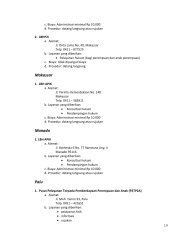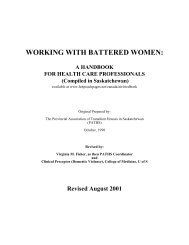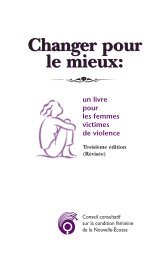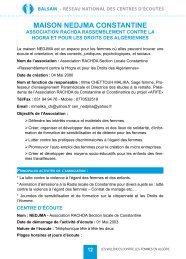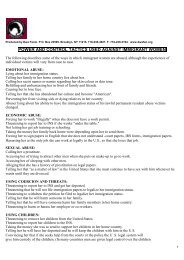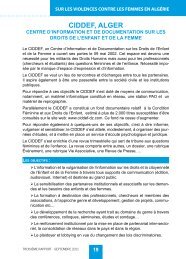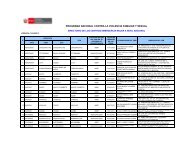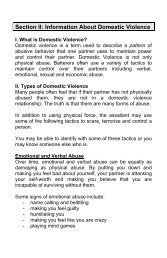Domestic Violence Counseling Manual - Hot Peach Pages
Domestic Violence Counseling Manual - Hot Peach Pages
Domestic Violence Counseling Manual - Hot Peach Pages
You also want an ePaper? Increase the reach of your titles
YUMPU automatically turns print PDFs into web optimized ePapers that Google loves.
• Does not know where to go to get help<br />
• Is intimidated by the police<br />
• Is disillusioned by police response to domestic violence<br />
She also may be afraid to leave because she is:<br />
• Terrified of the repercussions of an attempt to leave; harassment; increased violence if she fails to<br />
leave or goes to the authorities<br />
• Fears becoming homeless<br />
• Fears losing her children<br />
• Fears poverty and isolation (particularly if her abuser has isolated her from relatives and friends)<br />
• Fears what her family and friends might think of her<br />
She may be financially dependent on her abuser due to the fact that:<br />
• He controls all their money<br />
• She is forced to work at home and raise the children and is therefore unable to seek employment<br />
which would give her the freedom to seek an independent life for her and her children<br />
• Her contribution to a family business is not recognized by him and may not be recognized by the<br />
law<br />
• She did not receive enough schooling to be able to get a job<br />
• She has no job skills<br />
• The property is in her abuser’s name and she is unaware of each Belizean’s right to a plot of land<br />
(and even if she were she may not have the money to do anything with it)<br />
If she has prolonged exposure to abuse she may:<br />
• Start to rationalize her abuser’s behavior<br />
• Blame herself for provoking him (she has consistently been told that the violence is all her fault)<br />
• Believe that she deserves to be hurt<br />
• Be too mentally and physically exhausted to take the necessary steps<br />
• Not have confidence in herself and her ability to take action<br />
• feel like trying to leave is hopeless since the abuser seems omnipotent<br />
Even if she does leave it is tempting to go back because:<br />
• She cannot get enough practical or emotional support<br />
• The children are missing their dad<br />
• She is insecure<br />
• The abuser persuades her to go back<br />
Some of these factors are specific to Belize, in particular the practical aspects such as lack of support<br />
services, education about one’s rights and police response to domestic violence. Most of the emotional<br />
factors are common to victims of domestic abuse, except the last point, which is particular to Belize and<br />
cultures where gender inequality and machismo is strong. Factors specific to Belize are expanded upon<br />
later in the manual.<br />
15-56



